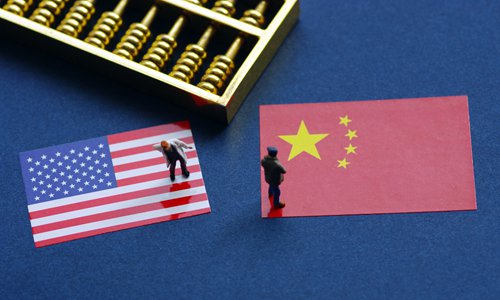US cliques would create inner antagonistic atmosphere of its allies
By Gao Lingyun Source:Globaltimes.cn Published: 2020/5/22 1:09:40

Photo: VCG
The US has been wooing and pressing its foreign allies and other countries to avoid cooperating with China in areas such as 5G technology, Huawei, and even with pandemic prevention methods, which have ended poorly. However, this strategy would create an inner antagonistic atmosphere among its foreign allies and cause significant economic losses.
The underlying purpose of the US is to hinder China's development, so it won't be surpassed by the second-largest economy. It has chosen to escalate conflict with China amid the novel coronavirus (COVID-19) pandemic to direct attention from its failures in handling COVID-19. During this election year in the US, populist anti-China hype could somehow help some politicians to gain short-term political interests.
The US sanctions and clique-forming have not garnered many benefits. Many American firms have chosen to stay in the Chinese market, including Tesla and Honeywell, which would be the same with its allies. Recently, foreign media reported that the US is asking its allies to reduce or cut cooperation with China in areas including technology and infrastructure, among others.
Without offering a substitute or competitive solution, the US is forcing its allies to choose sides, a market rule violation that would result in huge economic losses. Instead of having a powerful united front, the US would only receive verbal consent at most.
As the US bangs the so-called decoupling drum, this could cause tension in terms of politics, but it is an impossible mission economically. If anything, the China-US economic bond could become tighter.
From the perspective of US industries that rely on China, such as rare earth, raw medical materials, and prevention equipment, one way to reduce its ties with China would be for the US to set up buffer inventories. As the move would weigh expenses with each firm, it could only be launched by governments and would not be sustainable.
Meanwhile, the US restrictions on Chinese industries, in major high-tech sectors, where some are reliant on the US, would create two results. Driven by market principles, Chinese firms under restriction would receive technology or parts through circuitous paths. Foreign firms which harvest a large part of its profits from China may be forced to set up new research or production lines in China to develop business without support from US technology.
Though creating a clique against China might bring short-term private interest for certain politicians, it runs counter to US long-term national interests.
Members who take sides with the US or those forced to stay with the US, however, could experience inner antagonistic feelings since most have close relations with China. These countries have forces that support reducing ties with China, and strength calling for tighter bonds with the country.
Disrupting cooperation with China is against market rules. The US does not have a secondary solution for countries that cut cooperation with China, and especially with 5G technology, which has been disrupted by the US worldwide.
Bilateral cooperation between the US and China is beneficial for both sides in the long run and would still be the mainstream. It is critical to counter the ill-intended attempts of some US politicians to gain political benefits by undermining economic and trade cooperation. With the firm basic rule "only fight back when being violated," China would not fire the first shot, not would it ever concede to provocation.
There's no denying that China has shortcomings to shore up in the global market, including a better business environment, greater intellectual property rights protection, and a more standardized market, which it has actively improved.
As for those third parties who don't necessarily have to choose sides but intended to involved in it, it would be better for them to think it through and figure out a correct and favorable long-term solution.
The author is an expert at the Institute of World Economics and Politics under the Chinese Academy of Social Sciences. bizopinion@globaltimes.com.cn
Posted in: EXPERT ASSESSMENT